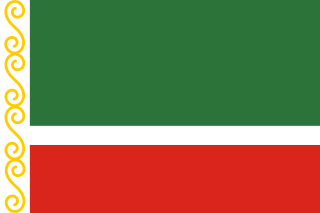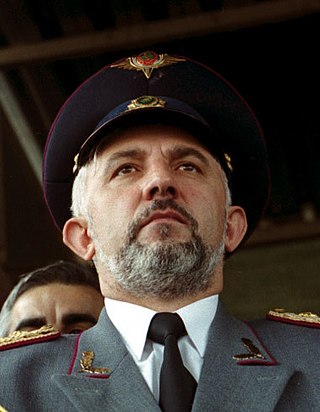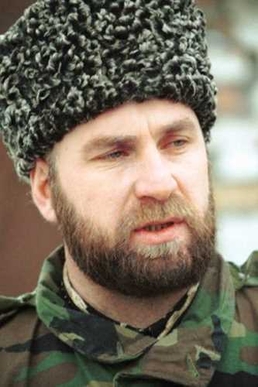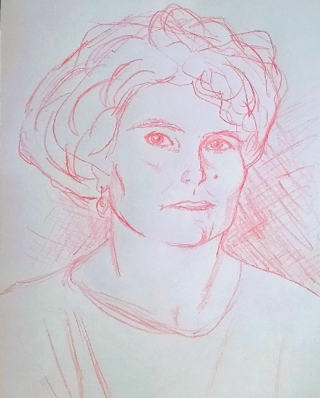
Chechnya, officially the Chechen Republic, is a republic of Russia. It is situated in the North Caucasus of Eastern Europe, between the Caspian Sea and Black Sea. The republic forms a part of the North Caucasian Federal District, and shares land borders with Georgia to its south; with the Russian republics of Dagestan, Ingushetia, and North Ossetia–Alania to its east, north, and west; and with Stavropol Krai to its northwest.

The Second Chechen War took place in Chechnya and the border regions of the North Caucasus between the Russian Federation and the breakaway Chechen Republic of Ichkeria, from August 1999 to April 2009.

Akhmat-Khadzhi Abdulkhamidovich Kadyrov was a Russian politician and revolutionary who served as Chief Mufti of the Chechen Republic of Ichkeria in the 1990s during and after the First Chechen War. At the outbreak of the Second Chechen War he switched sides, offering his service to the Russian government, and later became the President of the Chechen Republic from 5 October 2003, having acted as head of administration since July 2000.

Aslan (Khalid) Aliyevich Maskhadov was a Soviet and Chechen politician and military commander who served as the third president of the unrecognized Chechen Republic of Ichkeria.

Shamil Salmanovich Basayev, also known by his kunya "Abu Idris", was a Chechen guerilla leader who served as a senior military commander in the breakaway Chechen Republic of Ichkeria. He held the rank of brigadier general in the Armed Forces of Ichkeria, and was posthumously declared generalissimo. As a military commander in the separatist armed forces of Chechnya, one of his most notable battles was the separatist recapture of Grozny in 1996, which he personally planned and commanded together with Aslan Maskhadov. He also masterminded several of the worst terrorist attacks that occurred in Russia.

Zelimkhan Abdulmuslimovich Yandarbiyev was a Chechen writer and politician who served as second president of the Chechen Republic of Ichkeria between 1996 and 1997. In 2004, Yandarbiyev was assassinated while he was on mission to recognize Chechnya’s right for independence in Qatar.

Abdul-Halim Abusalamovich Sadulayev was the fourth President of the Chechen Republic of Ichkeria. Sadulayev served little more than a full year as President before being killed in a gun battle with FSB and pro-Russian Chechen forces.
Suleiman Bekmirzayevich Yamadayev, or simply Sulim Yamadayev, was a Chechen military commander. The fourth of six Yamadayev brothers, he fought for the Chechen Republic of Ichkeria during the First Chechen War before defecting to Russia during the Second Chechen War, in which he commanded Special Battalion Vostok under Spetsnaz GRU. As such, until 2008, he was officially in command of the biggest pro-Kremlin militia beyond those controlled by Chechen president Ramzan Kadyrov, who has led Chechnya since 2007. From 1 to 22 August 2008, Yamadayev was wanted on an active federal arrest warrant in Russia, but continued to command Special Battalion Vostok uninterrupted during the Russian invasion of Georgia.

Salman Betyrovich Raduyev was a Chechen terrorist and separatist field commander, from 1994 to 1999, who masterminded and was responsible for the Kizlyar hostage taking raid. His activities, in his role as a commander, made him "Russia's second most wanted man."

On 19 August 2002, a group of Chechen fighters armed with a man-portable air-defense system brought down a Russian Mil Mi-26 helicopter in a minefield, which resulted in the death of 127 Russian soldiers in the greatest loss of life in the history of helicopter aviation. It is also the deadliest aviation disaster ever suffered by the Russian Armed Forces, as well as its worst loss of life in a single day since the 1999 start of the Second Chechen War.

Turpal-Ali Aladiyevich Atgeriyev was a deputy prime minister, national security minister of Chechnya.

Ruslan (Khamzat) Germanovich Gelayev was a prominent commander in the Chechen resistance movement against Russia, in which he played a significant, yet controversial, military and political role in the 1990s and early 2000s. Gelayev was commonly viewed as an abrek and a well-respected, ruthless fighter. His operations spread well beyond the borders of Chechnya and even outside the Russian Federation and into Georgia. He was killed while leading a raid into the Russian Republic of Dagestan in 2004.

Ruslan Khamidovich Labazanov was a pro-Russian Chechen mob boss turned warlord who led the Russian-supported Chechen anti-Dzhokhar Dudayev faction in the First Chechen War.

The Chechen Republic of Ichkeria, known simply as Ichkeria, and also known as Chechnya, was a de facto state that controlled most of the former Checheno-Ingush ASSR from 1991 to 2000 and has been a government-in-exile since.

The 1999 war in Dagestan, also known as the Dagestan incursions, was an armed conflict that began when the Chechen-based Islamic International Peacekeeping Brigade (IIPB), an Islamist group led by Shamil Basayev, Ibn al-Khattab, Ramzan Akhmadov and Arbi Barayev, invaded the neighboring Russian republic of Dagestan on 7 August 1999, in support of the Shura of Dagestan separatist rebels. The war ended with a major victory for the Russian Federation and Republic of Dagestan and the retreat of the IIPB. The invasion of Dagestan alongside a series of apartment bombings in September 1999 served as the main casus belli for the Second Chechen War.

Arbi Alautdinovich Barayev was a Chechen warlord who in 1996 became the founder and first leader of the Special Purpose Islamic Regiment (SPIR) in Chechnya.

Nadezhda Chaikova was a correspondent for the Russian weekly Obshchaya Gazeta. A colleague of Anna Politkovskaya, she had traveled frequently to Chechnya and neighbouring regions. Near the end of the war, in 1996, she was kidnapped and killed by unidentified gunmen.
The 1998 abduction of foreign engineers took place when four United Kingdom-based specialists were seized by unidentified Chechen gunmen in Grozny, the capital of the unrecognized secessionist Chechen Republic of Ichkeria (ChRI). After more than two months in captivity, all four men were found brutally murdered, reportedly following a failed rescue bid. As of 2022, no one has been tried in this case.
Anti-Russian violence in Chechnya refers to acts of violence that were recorded against Russian and non-Chechen civilians in Chechnya from 1991 to 1994, which resulted in tens of thousands of ethnic Russians leaving or being expelled from the republic. Chechen separatists declared independence in 1991 as part of the disintegration of the Soviet Union before the First Chechen War began in 1994.
















